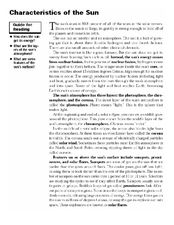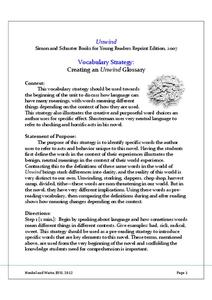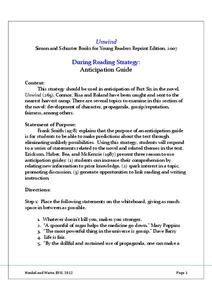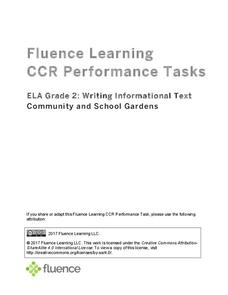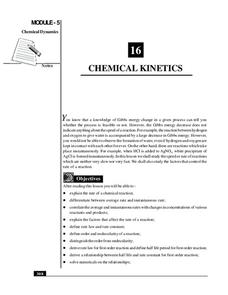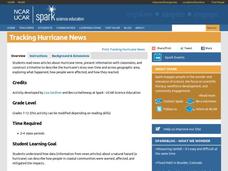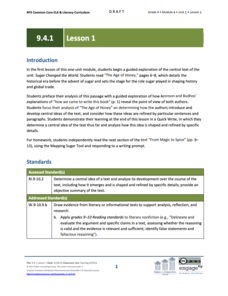Core Knowledge Foundation
Third Grade Skills Unit 3: How Does Your Body Work?
A skills unit combines ELA and science with lessons that explore the human body. Lessons begin with a reading, go into skills practice, and offer take-home materials. Skills practice includes listening to and discussing a read-aloud,...
Rice University
Characteristics of the Sun
After reading about how the sun gets its energy, and about the layers and features of the sun's atmosphere, heliologists complete a comprehension worksheet. On it, they label features on a diagram of the sun and match terms from the...
Scholastic
Study Jams! Mixtures
Mix it up at a party as Sam and Zoe discuss heterogeneous and homogenous mixtures and solutions. Follow this film by allowing your class to put together individual snack foods to make their own mixture!
Rainforest Alliance
Sounds of the Rainforest
Do you hear what I hear? Encourage scholars to use their listening skills and participate in a series of activities that demonstrate how the sense of hearing is crucial to the human and animal world. Activities guide learners on nature...
Lerner Publishing
Living or Nonliving
It's alive! Or is it? Through a series of shared readings, whole class activities, and independent exercises children explore the difference between living and non-living things, creating a pair of printable books to demonstrate their...
Texas Center for Learning Disabilities
Fourth-Grade Text-Based Intervention
Provide young readers with the extra support they need using this series of 10 literacy lessons. Following a repeated sequence of learning activities, these lessons engage children in expanding their vocabulary and developing their...
Curated OER
Zoo-Goers Ready to Greet Baby Panda
The Smithsonian's National Zoo, also known as the Washington Zoo, is one of the oldest zoos in the United States. Youngsters read and discuss a news article about Tai Shan, baby panda that was one of the zoos most famous residents. They...
Curated OER
Unwind: Vocabulary Strategy, Creating an Unwind Glossary
Prior to reading Unwind, Neal Shusterman's 2007 young adult science fiction novel, class members research the common definition of words drawn from the novel that will come to have a very different meaning to them as they are drawn into...
Curated OER
Unwind: Anticipation Guide
After responding to a series of prompts on an anticipation guide, readers of Unwind craft five predictions about what will happen in Neal Shusterman's young adult science fiction novel.
Fluence Learning
Writing Informational Text: Community and School Gardens
Two informational texts feature community gardens of the past and present and how seeds grow. Scholars read, discuss what they have read, complete a timeline, define words, and compose a brief essay about the texts' main idea.
Fluence Learning
Writing About Informational Text: Everybody Can Bike
A three-part assessment challenges scholars to read informational texts in order to complete three tasks. Following a brief reading, class members take part in grand conversations, complete charts, and work in small groups to research...
Curated OER
Unwind: Discussion Strategy, Chalk Talk
Readers of Neal Shusterman's young adult science fiction novel, Unwind, engage in a silent discussion, posting their responses to a series of statements about characters in the story.
National Institute of Open Schooling
Chemical Kinetics
Not all chemical reactions happen at the same rate because some, like explosions, occur quickly and some, like rusting, occur over time. Here, learners explore chemical reactions and their rates in the 16th lesson of 36. Through readings...
Science Matters
Matter Cycles — Sum It Up
Scholars become part of the cycle of matter with a reader's theater that showcases producers, consumers, decomposers, and the sun. A diagram and discussion concludes the learning experience and enhances comprehension.
Center Science Education
Tracking Hurricane News
Here is a unique twist for your lesson plan on hurricanes. After examining extreme weather news headlines, your storm chasers view a PowerPoint about hurricanes and then zoom in on Hurricane Irene. They map a timeline of her trek up the...
Scholastic
Study Jams! Plants without Seeds
Non-vascular plants do not develop seeds in order to reproduce. There are also some vascular plants that do not put out seeds. By viewing and reading through these six slides, green thumbs learn about mosses, liverworts, and ferns. They...
Curated OER
Bee Pollen Popular
The world would be a much different place without the help of pollinators. Read about the important role bats, hummingbirds, and various insects play in plant reproduction, exploring the interdependence of living things in an ecosystem....
Curated OER
Amos and Boris: Text Study
Twenty insightful questions follow a read aloud of the story, Amos and Boris by William Steig. Scholars then show what they know through completion of a cause and effect chart, reading fluency assessment, and a written explanatory or...
Scholastic
Study Jams! Magnetism
Six simple images pull your class into magnets. Most of the pictures show magnetic fields as revealed by iron filings. Concepts are explained in print along the bottom of each slide and include magnetic force, force fields, poles,...
EngageNY
Grade 9 ELA Module 4, Unit 1, Lesson 1
How do writers introduce and develop the central ideas in a text? To answer this question, ninth graders closely examine "The Age of Honey," the opening chapter in Marc Aronson and Marina Budhos' Sugar Changed the World: A Story of...
Minnesota Department of Natural Resoures
Parts of a Tree
Discover the parts of a tree and so much more with a packet of activities covering a range of subjects. First graders label practice pages, test their measuring and addition skills, explore books, dance, build 3-D trees, play games, give...
Institute of Electrical and Electronics Engineers
Exploring at the Nanoscale
Nano-nano! Nanotechnology can seem like it's from another planet! After learning about this tiny technology, collaborative groups experiment with how smaller particles affect chemical reactions. They do this by immersing a whole and a...
PBS
Stories of Painkiller Addiction: Prescription Drug Abuse Awareness Campaign
The I-STOP law was designed to regulate the distribution and tracking of prescription drugs. After reading an article about its signing and implementation, middle and high schoolers work together to come up with their own ideas for an...
Blake Education
Harry Potter and the Philosopher’s Stone
The motto for Hogwarts School of Witchcraft and Wizardry warns that one should never tickle a sleeping dragon, but learners will definitely be tickled by the activities in a packet of materials designed to accompany a reading of the...



